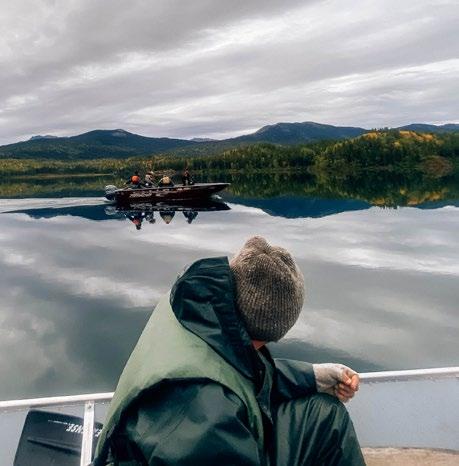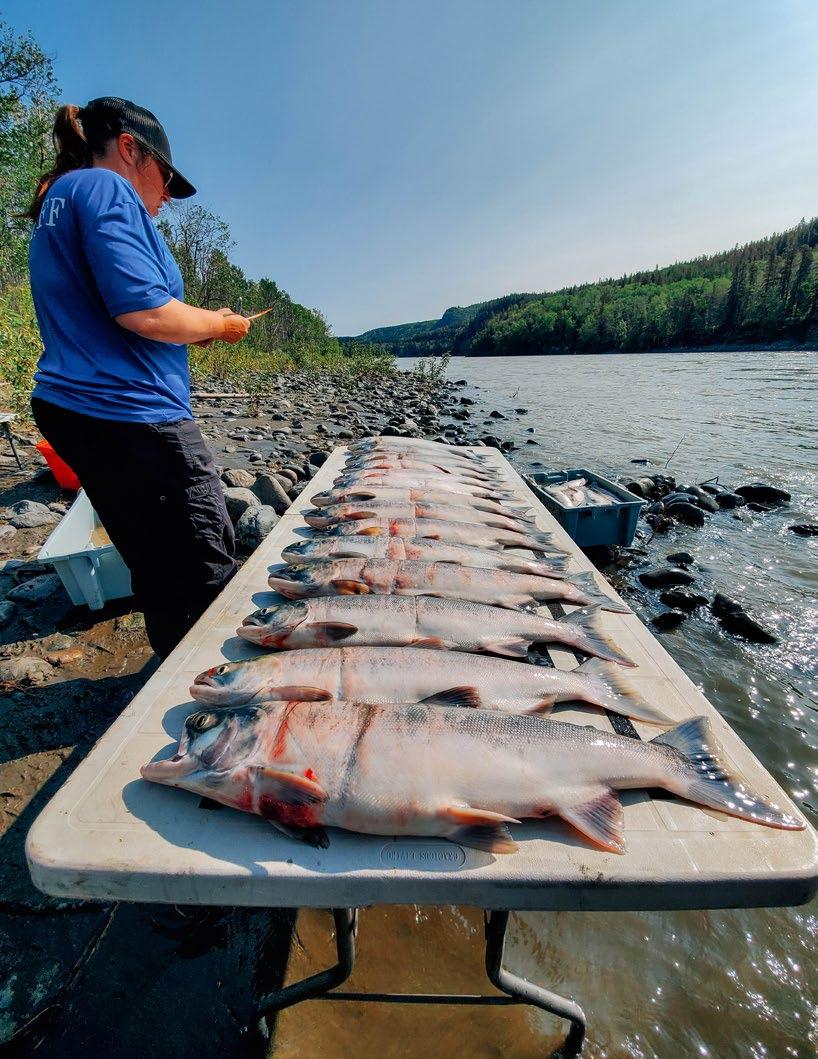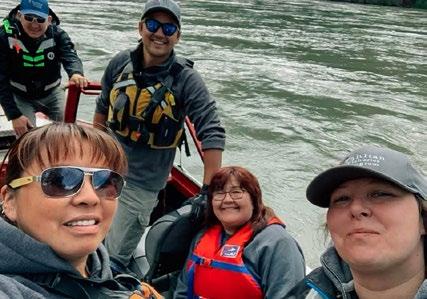
4 minute read
Klappan Moose Classification Survey & Stewardship Plan
FISHERIES
Director ’s Message
Cheri Frocklage
Fisheries Director
As Mehn ten tsedle (small lakes freeze month, October) has come to a close, I hope this update finds my fellow Tahltan Members healthy, happy and well prepared for the long winter months ahead.
Since assuming my new position as the Tahltan Central Government’s Fisheries Director in April, I have received so much support and encouragement from my fellow TCG Directors and the Executive Team. Mēduh to you all for sharing your knowledge and guidance as I navigated this new realm of fisheries management. It has been a very steep learning curve, and I am embracing the changes and the exciting new opportunities presented.
The 2020 field season is officially complete, remote field camps are closed for the winter, and the Tahltan Fisheries Department staff have all returned home to their families and loved ones. On that note, I wish to extend my deepest gratitude to my staff for their ongoing dedication and contributions to the management of the Stikine River salmon resources. It is you, the hardworking men and women on my field staff, who have made the Fisheries Department successful in our endeavours.
I am so fortunate to have Fisheries Manager Kerry Carlick on our team to assist me with program delivery and day-to-day operations. I honestly do not know how I would have pulled the season off without his involvement and leadership with staff, meeting attendance, planning and logistics, and technical support. The level of skill and knowledge this young man brings to the table is invaluable. Although the work we do is conducted in remote locations, we were not immune to the effects of this global pandemic we are all adjusting to and living in. Crew safety was the number one priority this year. Projects were modified in delivery to ensure the health and safety of all field staff and to reduce and/or eliminate any chances of infection both in transit and on the job sites. We extend our gratitude to the Dease Lake EMC staff for their leadership and implementation of Tahltan Territory COVID-19 protocols, which provided the fundamental tools necessary to ensure the health and safety of staff members throughout the field season.
This was by far the most unpredictable management season of my career. Despite the hurdles, the planning, re-planning, and in some cases, inevitable cancellation of projects, we remained positive, soldiering through, and providing the site expertise needed to count and sample these important stocks.
In addition to the health concerns, we experienced heavy rains and prolonged highwater conditions throughout the fishing season, as well as later run timing with the Tahltan Lake sockeye migration. Our staff persevered through the long days, waiting for late arrivals of salmon to their spawning grounds. It is not an easy task to keep morale up in remote camps when the fish arrive so late and I commend you for your patience.
We are currently working on our post-season reporting requirements and proposal submissions, and it goes without saying, there is rarely any down time, even in the off-season. We will be investigating and developing a comprehensive training package for our staff and will be seeking new hires for the 2021 field season. We encourage those interested in working in the Fisheries Department to watch for these upcoming training opportunities.
Discussions have already started on activities that will be offered to our local schools in Dease Lake, Iskut, and Telegraph Creek and planning is underway. With the uncertainty of a second wave of the pandemic, we opted not to run the classroom salmon incubators this year and are hopeful to bring this program back in the fall of 2021.
Post season meetings commence in November, which will kick off the first of many discussions throughout the winter that Kerry and I will be attending. These include the annual Transboundary Technical Committee, Enhancement Sub-Committee, Stikine River Salmon Advisory Committee, TFN Leadership /Fisheries and Oceans Canada G2G meetings, as well as the January and February Pacific Salmon Commission Transboundary Rivers Panel sessions. We are currently in the process of scheduling a meeting for a full presentation to the TCG Executive in mid-November. Before we know it, the pre-season meetings will be upon us and planning for the 2021 field season will be underway.
In closing, I would like to thank you, the Nation’s Members, for putting your trust in me to represent our fisheries interests at the table. I will continue to strive to fulfill this obligation to the best of my abilities. We are the unspoken voice for our salmon and our freshwater fish species, and they need our conservation and protection now more than ever.
Below: The crews daily race across Tahltan Lake to be the first on site to check on net pens and shelter.
FISHERIES
Update


The 2020 fishing season marked the return of the Fisheries Guardian position at Tahltan Fish Camp, with Margaret Asp returning to deliver the program.
The position was key in monitoring fishing activities within the food fishing corridor, especially with the closure of the Tahltan River to salmon fishing, and to relay any relevant fishing information or concerns to the public. The aim for the Fisheries Guardian project is to grow and evolve with the dynamic nature of fisheries conservation and management, and to work closely with Conservation and Fisheries Officers.
Above: Telegraph Creek Fisheries Staff. Back: Drew, Kerry Front: Noreen, Raïna and Margaret. Right: Raïna Feldman sampling at Glenora as part of the Stikine Stock Separation program.










